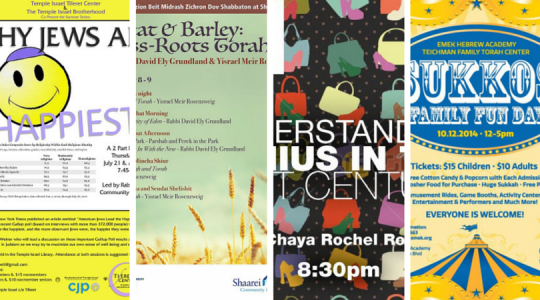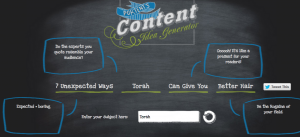
Designing a rich educational curriculum and writing an engaging Dvar Torah are skills that many rabbis and educators have mastered. However, if your new lecture series does not feature a compelling title, chances are that no one’s going to respond to the flyer, let alone read the email to learn more about the program.
Here’s the good news: There’s no mysticism or magic behind catchy names.
It’s simply a matter of proper planning, preparation and research. So, to help you get started, here are ten recommendations for creating eye-opening titles for your classes and events.
1. Look at Your Content
When you start brainstorming a fresh title, identify the key themes of your class or event and then jot down or type the most relevant titles that come to mind. Keep writing. Put down ideas that pop-up even when all you have handy is a napkin or scrap paper. Keep writing. Email ideas to yourself; no thought is too far-fetched. Keep writing.
Eventually you should produce a short list of possible titles addressing the essential themes of the class or event. The next several suggestions will help you sharpen and refine these titles.
2. Look Back
Look at the names of classes and events that drew big crowds in the past. Consider calling this class “Part 2″ or use similar words from the original title for a strong turnout for your Young Professionals meet-up.
3. Use the Right Verbs and Adjectives
Utilize adjectives and modifiers to make the name of your class more naturally shareable on social media and something that your students and congregants will WANT to forward via email to their friends and family. Consider beginning a title with ‘why,’ ‘what,’ or ‘how.’
Take a look at the video below on how to use choice words that pack a punch!
4. Solve a Problem
Outreach centers, shuls, and kollels often feature programs addressing pressing existential questions such as, “Why is it so difficult to stay married?” or “How can we verify the authenticity of the Torah?” The title of the program should reflect a practical, thought-out solution. For example: “The Jewish Positive-Psychology Approach to Building a Solid Marriage.”
These types of titles are usually found on ‘How to’ or ‘X Ways to’ posts, and instantly communicate the benefits of the upcoming class or event in one sentence.
In order for this to be a success, you need to research your potential audience. Analyze on-site search queries and explore the long tail variations of popular keywords related to your brand. Use that data to formulate an impactful title.
5. Offer A (New) Insight on a Contemporary Topic
Breaking news, discoveries and trends offer Jewish educators the opportunity to attract participants interested in understanding the relevancy of Judaism to contemporary issues. Titles should capture the energy of these cutting edge developments; e.g., “Judaism’s No-Handoff Approach to Deflategate”.
Moreover, create titles that will clearly target a particular audience. For example, feature a class for doctors on the new proposal to provide unapproved medication for patients, “A Jewish View on the ‘Compassionate’ Use of Unapproved Meds.”
6. Be Opinionated
Sometimes, it’s OK to talk politics. Other times it’s not. Israel and anti-Semitism are sensitive issues that many organizations tackle. Let the title frame the issue: “Why Harvard Should Not Divest from Israel.”
7. Laugh!
If your subject matter isn’t too serious (or it’s close to Adar), then you might consider using a funny title. Some humorous titles focus on wordplay or simple puns. Be careful not to belittle any group or person, or a topic that others take seriously.
8. Is Your Title Clickable?
In order to get people to come hear your guest speaker or attend your Shabbaton, you need them to click on your email (and the link within it) to learn more and sign up for the event or special weekend.
As such, we encourage you to look at this GrowthHackers post that charts the unbelievable rise of the relatively new ‘viral news’ site Upworthy.
The formula for their titles is easy. They present half the information and then tempt you to click by creating titles such as:
X did Y, and you won’t believe what happened next!
I cried when I saw what had happened to X, and you will too.
Love X? Let’s see if you still love them after you see Y!
Tachlis…should you use titles like this?
That depends on you and your organization and who you are trying to reach. Keep in mind that to some people of a certain age or background, you could end up pushing your audience away, and devaluing your organization by having a title like this.
9. Use a Free Online Tool
There’s a slew of online tools out there that can help you think of a great catchy title. Ultimately, you may not use the title that it suggests. But, it will get the creative juices flowing and help you come up with a great title.
One such online tool is Portent’s amazing content idea generator.

10. Use NLEResources.com to Help You Brainstorm
NLEResources.com has collected hundreds of flyers from classes, special events and Shabbatonim from around the world. Invariably, what you are setting out to do may have been done elsewhere. Take a look at our PR Samples and collection of flyers here and see how other organizations named similar events.
Making the Final Decision
After you’ve worked through all the steps above, you will either be left with one winning title that is the obvious choice, or a few strong options that you can discuss with your colleagues to reach a final decision.
Hatzlacha!



















